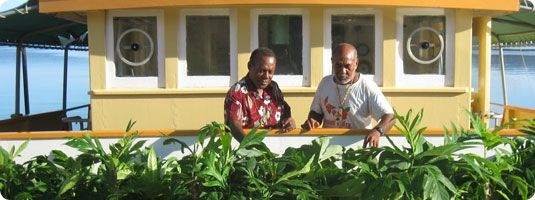The Salination Solution: Atoll Permaculture

Joel is a farmer on one of the islands of Ontong Java, a remote atoll 160 miles north of the main group of the Solomon Islands, in the Pacific Ocean. Approximately 2,000 people live on the atoll, which is made up of over 122 islands. Because most of Ontong Java’s islands are coral formations that barely break the surface of the water, nearly everyone lives in one of two villages: Luaniua on the eastern end, and Pelau in the north.
People in Ontong Java make their living through subsistence agriculture. Trade is difficult because of the distance and unpredictability of the voyage between the atoll and Santa Isabel Island, the nearest of the Solomons. The main crops are coconut and taro root, a plant that grows well in wet or flooded soil. Taro is a staple food of many African, Asian and Oceanic countries.
However, even though taro grows well in wet conditions, not all varieties are saline resistant. A few years ago, people in Ontong Java started noticing changes in their coastline – then they realized that in certain areas, the ground was saturated with water and crops weren’t growing as well as they used to. While the rise of sea levels may not be noticeable in many countries, in Ontong Java the islands are small and relatively flat, so even a few inches of extra water can make a surprising difference. When salt water invaded the atoll, the amount of fertile land decreased sharply, and Joel and the other farmers started to look for solutions.
There were two basic problems that needed to be solved: first, there was less fertile land than before, and second, the rest of the land that used to be fertile was now saturated with sea water. Through discussions with workers from the Climate Change Program of the Anglican Church of Melanesia, Episcopal Relief & Development’s partner in the region, the farmers figured out new ways of using both the fertile and salinated land. By adapting the philosophy and techniques of permaculture to their local environment and importing saline-resistant plants to replace other crops in the sea-soaked areas, Joel and his fellow agriculturalists could produce sufficient food to feed their communities while protecting and enriching the land.
Permaculture is a hybrid word, made up of “permanent” and “agriculture.” The idea is that, in contrast to traditional agriculture where a field is plowed and only one kind of seed is sown over a large area, many kinds of plants are sown together, with special attention to the nutrient needs and output of each one. In permaculture systems, one plant may need a lot of nitrogen in the soil, but another plant may be a “nitrogen fixer” that takes it out of the air and transfers it to the soil. Placing complementary plants together helps both of them grow, while enriching the soil and improving its quality.
According to a report by Jasper Bonie, the manager of the Melanesian Church’s permaculture initiative, the “Atoll Permaculture” gardening system will be a multi-layered system including fruit trees, vegetables and root crops, such as taro. “We would like to create a farming system that is permanent, self mulching, self sustaining and self regenerating, and that can provide a good source of food. We would also like to create a system that will demand less time and has low maintenance cost. We can imagine a forest of food where food can be collected when required.”
The other part of the salination solution is importing saline-resistant plants to sow in areas where other crops will no longer grow. This not only allows the land to become productive again, providing critical food for the local community, but it also helps to bind the soil and prevent erosion. For Joel and his neighbors on sandy Ontong Java, preserving the small amount of land that people are able to live on is vital.
“It is incredible to actually be able to see climate change in action, and equally amazing to see the ways people are innovating and adapting as a result,” said Nagulan Nesiah, Program Officer for Episcopal Relief & Development. “In a place like Ontong Java, people’s lives and livelihoods depend on the health of the soil and their ability to farm and produce food for their families. We are glad to support the development of local solutions to a problem that often seems abstract, but which is very real for them.”


